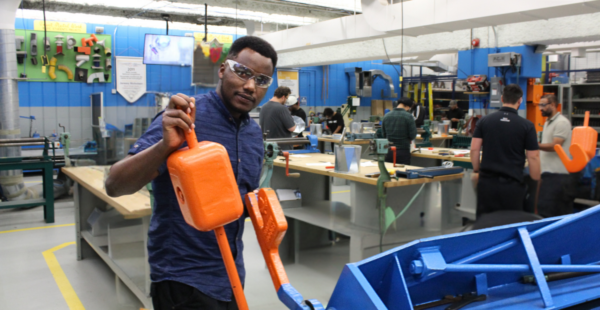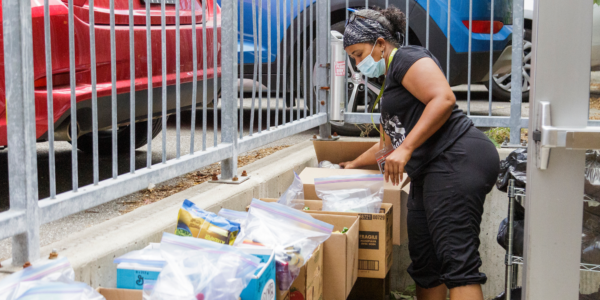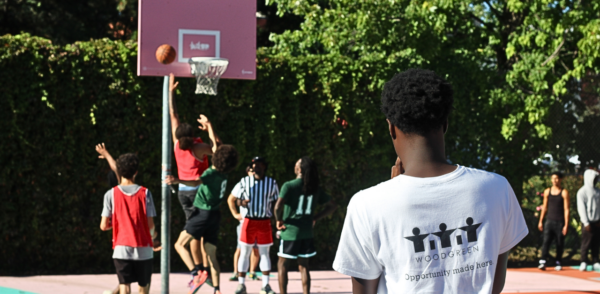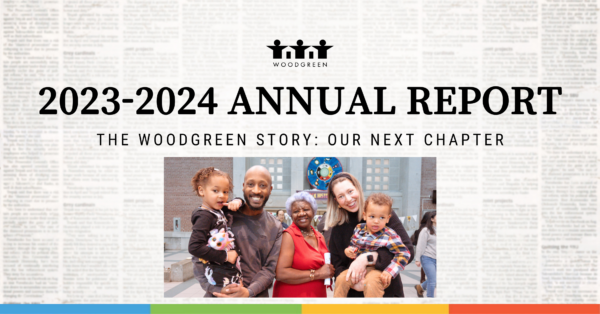Most parents will tell you, it’s a proud moment the first time a child ties their shoe. For Rene Pavlovic, it’s something she wasn’t sure she would ever see.
“He’s doing amazing!” exclaims Rene, mother to six-year-old Jacob.
Her little boy with sandy-blonde hair and a wide smile has autism. He was diagnosed at two-and-a-half years old and is nonverbal – “for now”, says Rene. There is a tone of both optimism and determination in her voice that she says WoodGreen has helped put there.
Small goals, big wins
Shortly after Jacob’s diagnosis, Rene connected with WoodGreen’s Parent Outreach Program. It’s an individualized program designed specifically for parents of children with developmental disabilities.
“We work with parents on various goals that they set up for their children,” says Bonnie Heath, Supervisor of the Parent Outreach Program (POP). Children range in age from two-and-a-half to 18, many of whom, like Jacob, have autism.
“We also have parents of children with Down syndrome, cerebral palsy as well as lots of chromosomal deletions,” says Bonnie, who has been helping coach parents for the past 32 years. Her motivation: Be the person she wishes she’d had when she was a young mother nearly four decades ago.
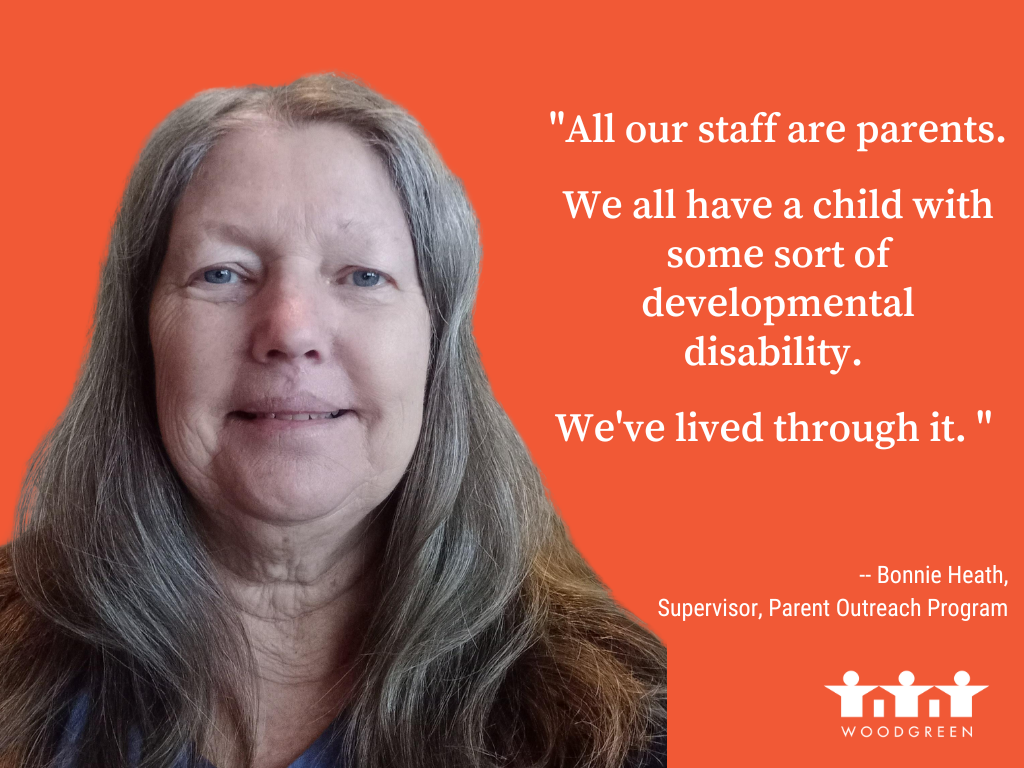
‘We’ve lived through it’
When Bonnie’s second child, Jenny, was born with Down syndrome in 1985, there weren’t many success stories for parents of children with special needs to look to.
“It was a bit doom and gloom,” says Bonnie. “It was only the beginning of people not putting children like Jenny into institutions.”
Bonnie’s experience raising Jenny makes her ideal to guide new parents through the challenges of bringing up a child with a disability. It does not, however, make her unique; at least not in WoodGreen’s Parent Outreach Program.
“All our staff are parents, and we all have a child with some sort of developmental disability,” says Bonnie. Each of the 110 clients in the program is partnered with one of seven workers
“We’ve lived through it,” says Bonnie, who says staff are able to connect with parents in a way others may not. “It comes from knowing what it's like to raise a child with a disability.”
Parents fighting for services
POP is a three-year program that is initially a weekly, one-on-one, hour-long session with parents. Visits have been in-home in the past but went virtual during the COVID pandemic. Parents are often referred to the program through a doctor, family or friend, school or social worker. The only requirement is that they are a parent or caregiver to a child with a developmental disability. (Some children have not yet received an official diagnosis, but WoodGreen can help guide parents through that process).
Bonnie and her team have all had to deal with the mountains of red tape that can be associated with accessing government funding and services.
“Navigating the system of developmental services is always complicated,” she says.
“Lots of paperwork and doctor visits to get the right documentation. We have a lot of families that are either recent immigrants or where English isn’t the first language and many don’t understand the system.”
She says sometimes parents are reluctant to push for services for their child or to challenge authorities, but it frustrates Bonnie that they even need to.
“The hardest part for me was not raising Jenny or supporting her. It has been dealing with all the systems and having to fight for absolutely everything in her life. Sadly, it's still a fight for parents today. We try to help with that.”
WoodGreen staff occasionally accompany parents to school meetings in order to help families advocate for services for their child.
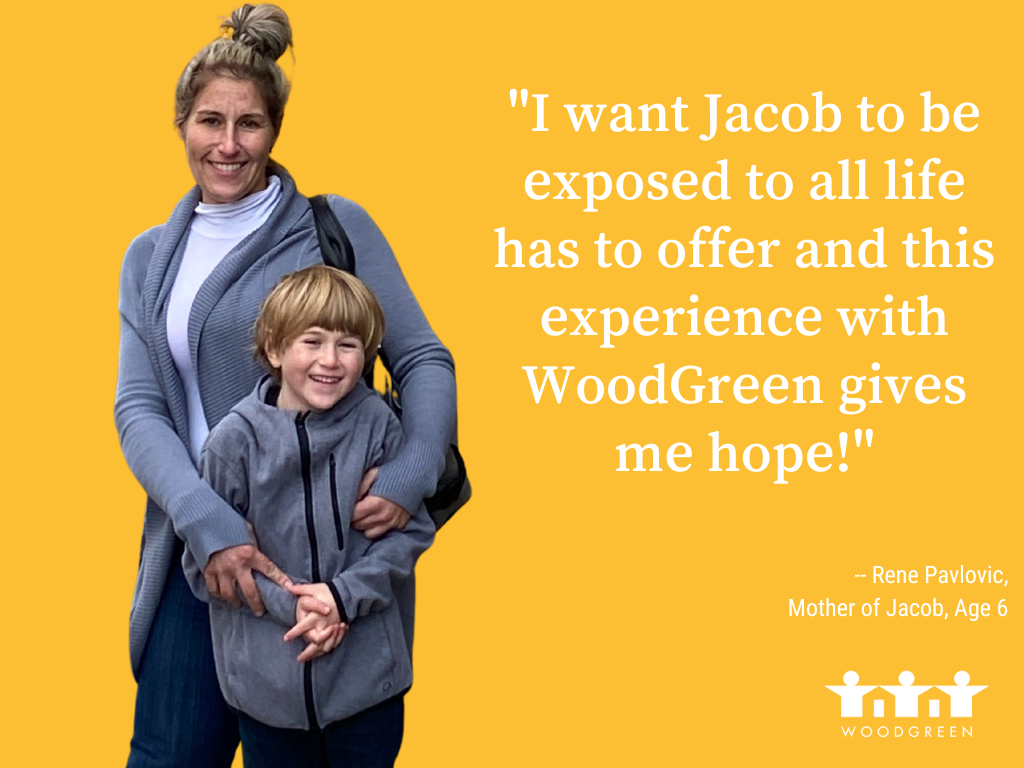
Giving parents confidence
For Rene, her connection with her case worker, Janet, has been vital to not only Jacob’s development, but Rene’s confidence as a parent.
“It’s a completely different experience when you are raising a child with autism and Janet gets that,” she says. “Her son also has autism and she has given me all these tips.”
It’s thanks to Janet’s advice for how Rene could break down the steps involved, that Jacob is now able to tie his shoes. Together, the women have set little goals for Rene to work on with Jacob, like learning to zip up his coat or bring a dish to the sink.
“The little follow-up phone calls from WoodGreen gave me a little push to keep trying,” says Rene.
Success stories help overcome doubts
In the second year of the program, parent check-ins shift to bi-weekly and in the third year parents and counsellors connect as needed.
When Jacob approached school age, Rene knew she would need help.
“I knew I wanted him to go to a normal (mainstream) school, but I knew he would need support. I didn’t know what all the acronyms meant. But WoodGreen helped me navigate getting him enrolled in school.”
She says WoodGreen staff were able to connect her with the “spider web” of services that are out there to help children like Jacob and parents like herself. They helped her access respite services, which provide short-term care to give families a bit of a break from the challenges of parenting a child with special needs. WoodGreen also gave her details on camps that Jacob could attend, as well as sports, clubs and activities that would be ideal for him.
When Rene thinks back to the early days after Jacob’s diagnosis, she says she recalls her overwhelming sense of fear and doubt over what her little boy would ever be able to achieve.
But after three years with WoodGreen and hearing Janet’s positive stories about her own son’s achievements, Rene says she feels something else: “I want Jacob to be exposed to all life has to offer,” she says, “and this experience with WoodGreen gives me hope!”
-
Find out more about our Parent Outreach Program HERE.


